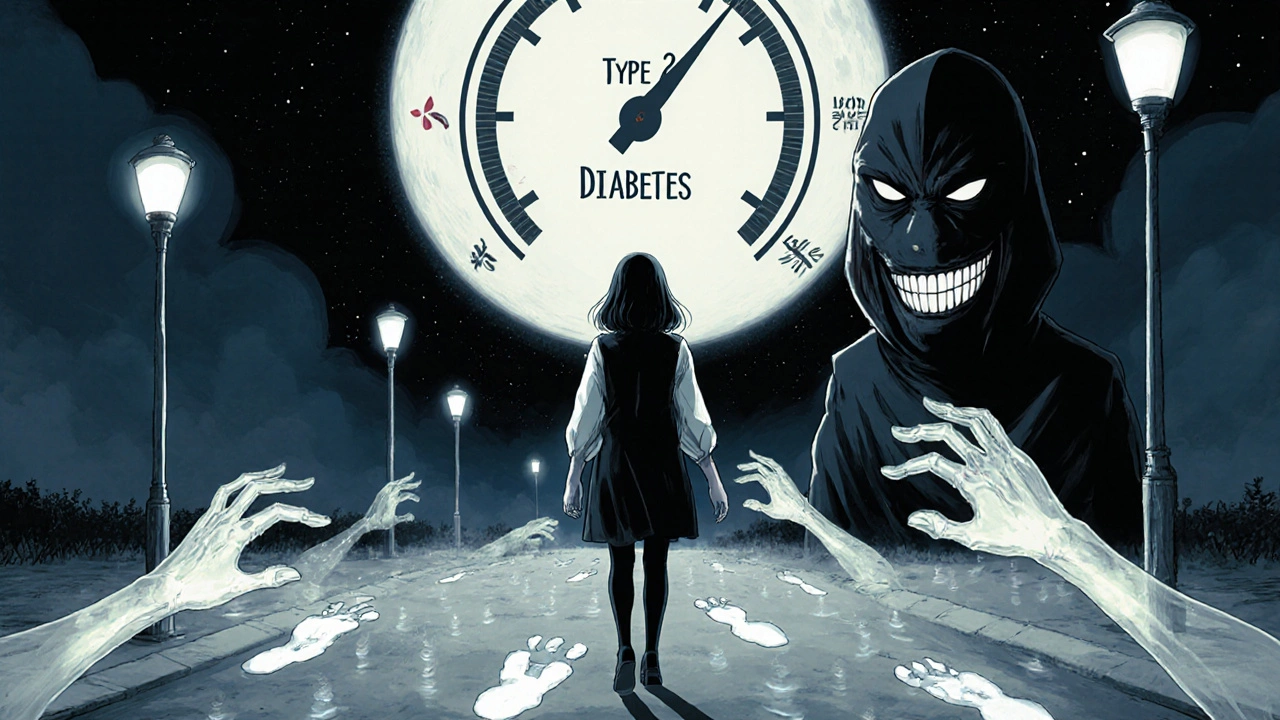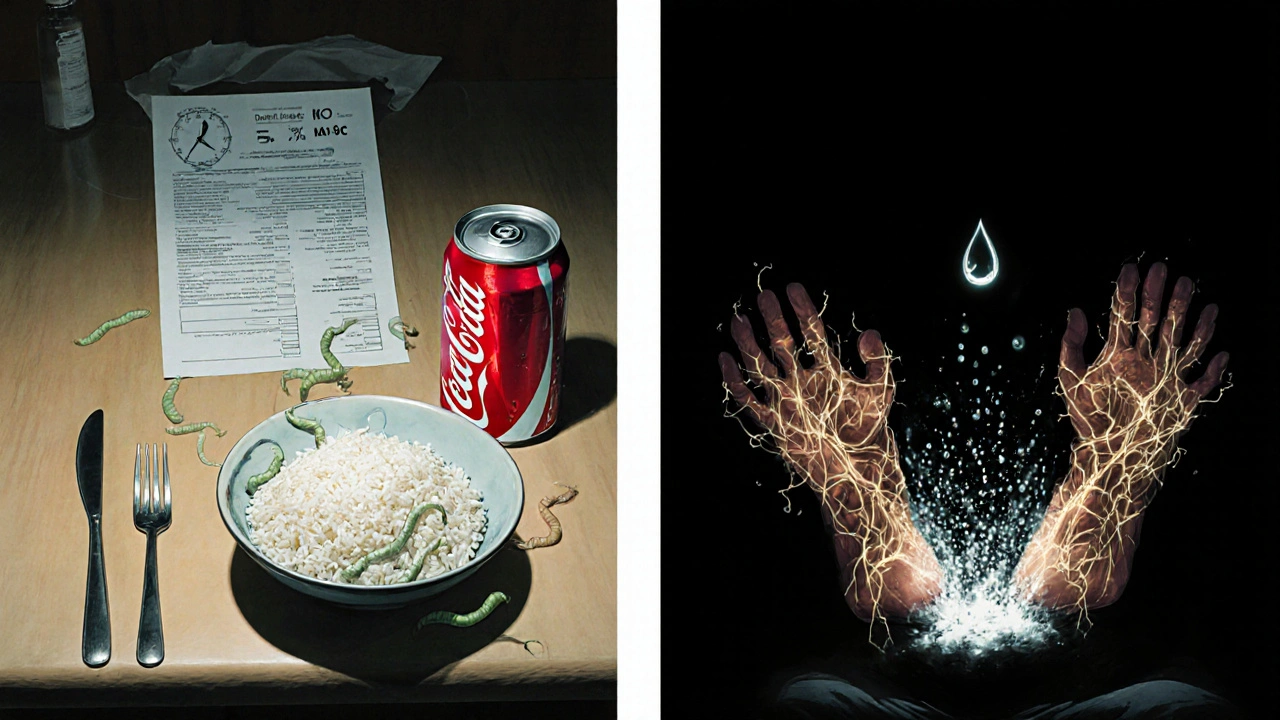What Prediabetes Really Means
You might not feel sick. You might not even feel different. But if your blood sugar is higher than it should be - not quite diabetic, but not normal either - you have prediabetes. This isn’t just a label. It’s your body’s last chance to avoid type 2 diabetes. And here’s the truth: most people don’t know they have it. In fact, more than 80% of those with prediabetes in the U.S. are completely unaware. That’s not because they’re ignoring their health. It’s because prediabetes rarely comes with obvious symptoms.
Think of it like a car warning light. The engine isn’t broken yet, but something’s off. Left unchecked, 15 to 30% of people with prediabetes will develop type 2 diabetes within five years. But here’s the good news: that progression isn’t inevitable. The landmark Diabetes Prevention Program study showed that losing just 5 to 7% of your body weight and getting 150 minutes of walking or similar activity each week cuts your risk by 58%. That’s not a miracle. It’s science.
The Hidden Signs - Even If You Feel Fine
Doctors will tell you prediabetes usually has no symptoms. And they’re right - for most people. But that doesn’t mean there aren’t clues. Some of them are subtle. Others are easy to miss because they seem normal. Here’s what to watch for:
- Constant thirst - Drinking more than 3 liters of water a day without working out or being in the heat? That’s your kidneys trying to flush out extra sugar. Every time glucose spills into your urine, it pulls water with it. You’re not just thirsty - you’re dehydrated.
- Frequent urination - Going more than 8 times a day? Especially at night. That’s your body’s way of getting rid of the sugar it can’t process.
- Blurred vision - Your eyes aren’t failing. High blood sugar causes fluid to shift into the lens of your eye, making it swell slightly. That changes focus. It comes and goes. You might think it’s just eye strain.
- Unexplained fatigue - You sleep enough. You’re not stressed. But you’re tired all the time. That’s because your cells aren’t getting the glucose they need to make energy, even though there’s plenty in your blood.
- Dark, velvety skin patches - Look closely at your neck, armpits, or groin. If the skin looks dirty or thickened, it’s not dirt. It’s acanthosis nigricans, a sign your body is flooding your system with insulin to compensate for resistance.
- Slow-healing cuts or infections - A scrape that takes more than two weeks to close? Recurring yeast infections (three or more a year)? A urinary tract infection every few months? High sugar weakens your immune system and feeds bacteria and fungi.
- Tingling or numbness in hands or feet - This isn’t just "pins and needles." It’s early nerve damage from sugar toxicity. It starts mild, but it doesn’t go away unless you fix the root cause.
Women might notice additional signs: irregular periods, vaginal dryness, or trouble getting pregnant. These aren’t just "hormonal issues." They’re metabolic signals.
How It’s Diagnosed - No Guesswork
You can’t diagnose prediabetes by how you feel. You need a blood test. Three standard tests are used:
- A1C test - Measures average blood sugar over 2-3 months. A result between 5.7% and 6.3% means prediabetes.
- Fasting blood glucose - After 8 hours without food, a level of 100-125 mg/dL is prediabetic.
- Oral glucose tolerance test - You drink a sugary solution, then your blood is checked two hours later. A result of 140-199 mg/dL means prediabetes.
Doctors recommend screening if you’re over 35, overweight (BMI over 25), have a family history of diabetes, or have had gestational diabetes. If you’re Asian, the threshold is lower - BMI over 23 is enough to warrant testing. And if you’ve already been told you have prediabetes, get tested every year.

Reversing It - The Real Plan
Reversing prediabetes isn’t about diets. It’s not about cutting out carbs completely. It’s about changing how your body uses energy. The most proven method? The CDC’s National Diabetes Prevention Program. It’s not a supplement. It’s not a detox. It’s a 16-week program built on two pillars:
- Move more - 150 minutes a week of moderate activity. That’s 30 minutes, five days a week. Walk. Swim. Dance. Gardening counts. You don’t need a gym. Just move.
- Eat smarter - Lose 5 to 7% of your body weight. For someone who weighs 200 pounds, that’s 10 to 14 pounds. You don’t need to count calories obsessively. Focus on whole foods: vegetables, lean protein, beans, nuts, whole grains. Cut out sugary drinks, processed snacks, and white bread. Swap them out. Don’t just remove - replace.
One study showed that people who followed this plan for a year had their fasting blood sugar drop from prediabetic levels into the normal range. Half of them reversed their condition entirely. That’s not luck. That’s biology.
What Doesn’t Work
There are a lot of scams out there. You’ll see ads for "prediabetes cures" - special teas, pills, or detox kits. None of them work. The only thing that reverses prediabetes is sustained lifestyle change. Supplements don’t lower blood sugar the way real food and movement do. Fasting for days? It might drop your sugar temporarily, but it doesn’t fix insulin resistance. And it can backfire.
Also, don’t wait for symptoms to get worse. By the time you feel exhausted, thirsty, and blurry-eyed, your body has already been under stress for months - maybe years. The goal isn’t to fix symptoms. It’s to stop the damage before it becomes permanent.

Real People, Real Results
In Melbourne, a 52-year-old teacher named Lisa had an A1C of 6.1%. She was told she had prediabetes. She didn’t feel sick, so she didn’t think it mattered. A year later, her A1C was 6.8%. She started gaining weight. Her knees ached. She was diagnosed with type 2 diabetes.
Another woman, 48, with an A1C of 5.9%, joined a local CDC-recognized program. She walked 30 minutes every morning, swapped soda for sparkling water, and started eating dinner with her family instead of in front of the TV. After six months, her A1C dropped to 5.4%. Normal. She didn’t take a pill. She didn’t have surgery. She changed her habits.
That’s the difference.
What Comes Next
Technology is helping. Apps like Virta Health and Omada Health connect you with coaches, track your food and movement, and give you feedback in real time. Some even use continuous glucose monitors (CGMs) to show you how your body reacts to meals. But the core hasn’t changed: eat better, move more, lose weight, stick with it.
And if you’re over 45? Get tested. Even if you feel fine. Especially if you feel fine. The longer prediabetes goes unnoticed, the harder it is to reverse. But if caught early? It’s not a life sentence. It’s a wake-up call.
Don’t Wait for the Diagnosis
You don’t need to wait for your doctor to say "you have prediabetes" to start acting. If you’re overweight, sedentary, or have a family history of diabetes, you’re already at risk. Start walking. Swap out one sugary drink a day. Add a vegetable to every meal. These aren’t big changes. But they add up.
Prediabetes isn’t a disease. It’s a decision point. And the best time to make the right one? Now.


Mark Kahn
November 21, 2025 AT 11:15Leo Tamisch
November 22, 2025 AT 22:28Shawn Sakura
November 24, 2025 AT 12:18Nikhil Purohit
November 24, 2025 AT 12:19Debanjan Banerjee
November 25, 2025 AT 19:36Steve Harris
November 27, 2025 AT 13:43Sheldon Bazinga
November 28, 2025 AT 21:09Sandi Moon
November 29, 2025 AT 20:46Kartik Singhal
December 1, 2025 AT 00:19Logan Romine
December 2, 2025 AT 00:02Chris Vere
December 2, 2025 AT 13:47Pravin Manani
December 3, 2025 AT 12:27